Welcome to, “From the Beginning: A Nomadic Tale,” the origin story from one of our writers, and how he started out his life on the road in 2019; at age 64. Norm Bour now has 43 countries behind him, over 50 in total, and is currently in Asia for the year. This series shares how it began and how you might be able to do it, too. You can also check out his initial story, and parts I, and part II, just recently posted.
You can learn more about them from their website, TravelYounger.com, and also his books, including Nomadic Life for All Ages, and his new one, The History and Magic of Northern Greece.
In our last chapter I shared a list of what I consider to be the top places where potential nomads might want to live, and five of the six are in Europe, ie, the European Union, but more importantly, the Schengen Zone. Here’s that list of where many people might want to live:
- Italy
- Spain
- Greece
- Portugal
- France
- Mexico
And I said that probably 70 percent of people thinking of leaving the US might want to go to these countries.
We did, too, but realized that rules would NOT allow US passport holders like us to live more than 90 days at a time in ANY of the 29 countries that are collectively part of the Schengen Zone.
The rules are quite complex, so I won’t go into them, but you can read my free guide that I wrote a few years ago about how to play what I called the Schengen Chess Game. And that’s what it is- a game. But if you know the rules, you can travel quite freely amongst amazing countries, and get the best of both worlds.
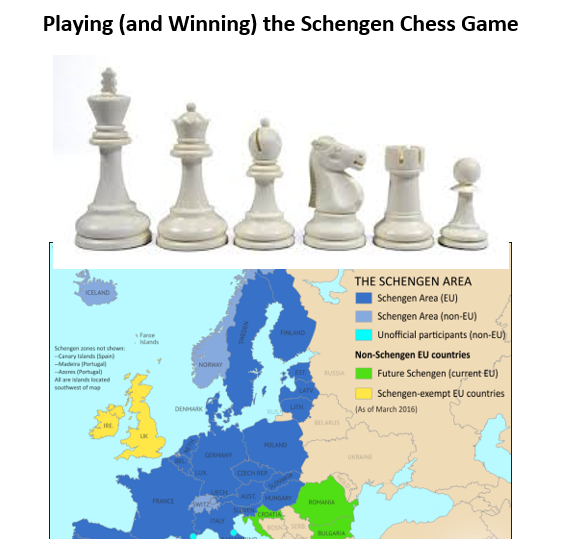
I think that Italy is one of the most magnificent places in the world, and that was our second stop as nomads. The town of Tivoli, just outside Rome, is 600 years older than Rome, and is rife with brilliant history.
Within the town are three historical sites; the Parco Villa Gregoriana, which is a huge walkable ravine with waterfalls, cliffs, and caves; Villa d'Este, a UNESCO World Heritage site, which is a Renaissance estate with hundreds of gravity fed fountains; and Villa Adriana, another UNESCO site, also known as Hadrian’s Villa, which is a beautiful and elaborate estate with amazing water features and statues.
In Tivoli I had my first “Oh My God, this is real history,” moment, when I was told that our very small apartment we rented was over 500 years old. In the US, houses that are two to three hundred years old are “old,” and we didn’t have much left that was older than that. In Italy, and much of Europe and the world, history goes back thousands of years, long before the US, and in Egypt, even further, still.

Now that we were in our second home, we were getting used to some things, and developed routines and rituals. When we heard someone speaking English in the streets, we would try to start a conversation, and over our time in Italy (and elsewhere), we met many people who are still friends today. Some are nomads, like us, some were visitors on vacation. Either way, we shared our trip, and learned about them, so our world continuously opened up with new cultures.
Two of those new friends were from Rhode Island, and when they told us they were renting a car and driving to the Amalfi Coast, I jokingly said, “How many seats does your car have?” and she replied, “Oh, would you like to join us? We’d love to have you!” and within an hour we went back to our room, packed an overnight bag, and took off on a road trip.
We figured we’d find our way back since they were returning the car somewhere down south, and by using Maps and apps for trains, we were able to spend two days in Amalfi and Sorrento, then take the train back from Naples. Such an experience.
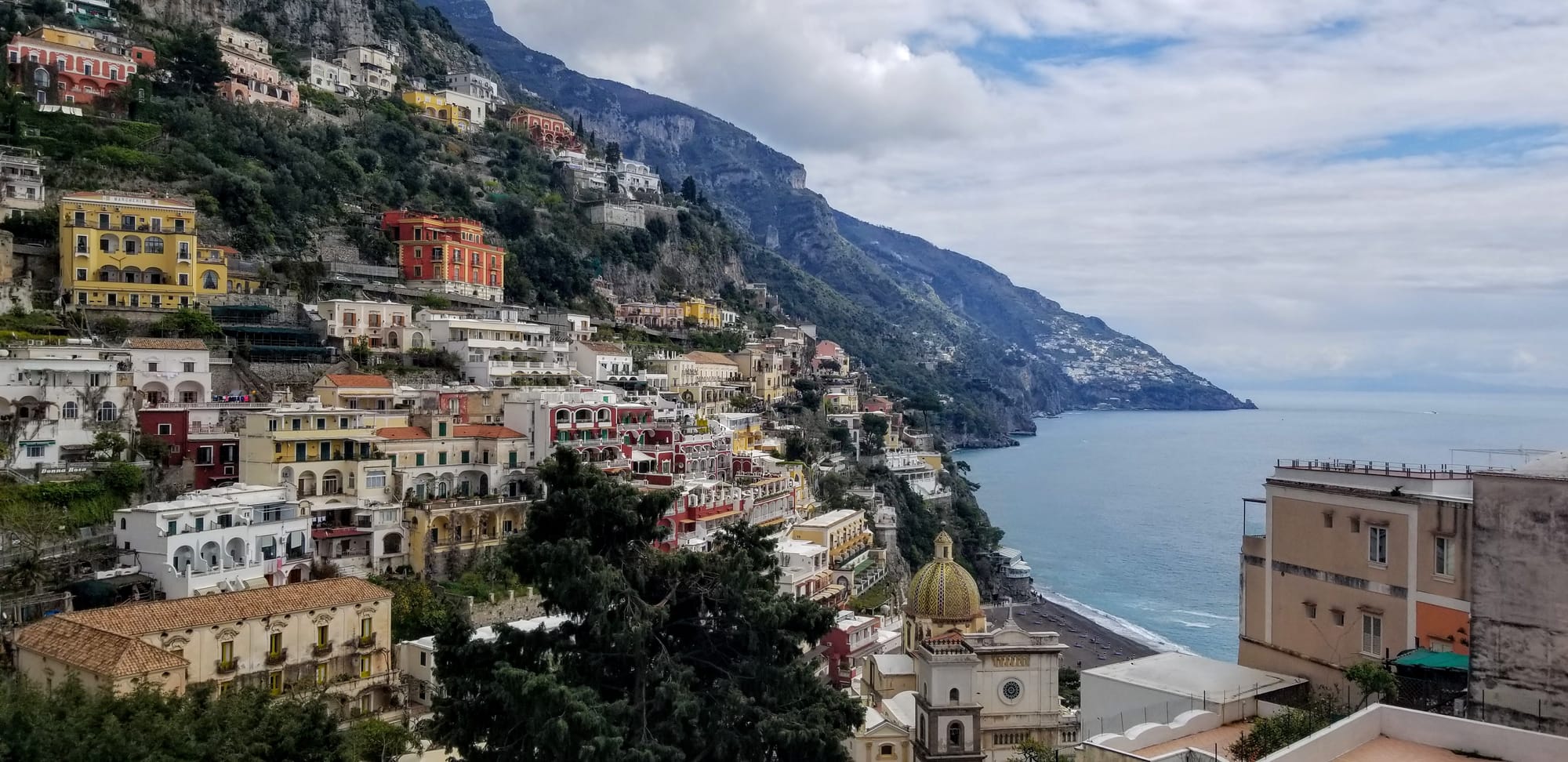
Summer was now approaching as we had been on the road three months, and by mid-May it was time to exit Europe. After 45 days in Spain, then 45 days in Tivoli, we took the train from Rome to Ancona, on the eastern Italian coast, and then hopped a ferry across the Adriatic Sea, leaving about sunset, and arriving the next morning at sunrise in Split, Croatia.
Croatia, like many of the former Communist bloc countries, was not considered “Europe” or the EU, and also not part of the Schengen. That part of the world, the Balkans, is very unique in that it is close to Europe, but many are still Schengen-free, so can be used as a “reset” for those who need to stay out for 90 days.
When Croatia became part of the Schengen in 2023 it made us—and many others—cry, since Croatia is a great country, and many travelers used it as a Schengen reset location. Now that option is gone, as is Romania and Bulgaria, who became part of the Zone this year.
The options of eastern Europe are STILL there, but dwindling, and we have been to many of them and have no difficulty going back to any of them for three months to reset our Schengen clock.
It's a big world, with almost 200 countries to visit if you choose. Many you probably would not want to visit for a host of reasons, but when it comes to starting your nomadic travels, think about the following. And these are all based on being US citizens leaving from the US.
Distance from “home.”
In our case we had no children or elderly parents to worry about, but leaving the US to go to Australia or Asia is a HUGE step. Because of that, many opt for our closest “foreign” neighbor, and that’s Mexico. I don’t count Canada since it’s so America-like, and I don’t see that as being a true nomadic destination if you want something different.
We lived in Mexico during COVID, about 15 months, and we liked it a LOT more than I ever would have expected. We were in Puerto Morelos, a small fishing village about 30 minutes south of Cancun, and COVID barely touched us. We had to wear masks in grocery stores and certain areas, but many restaurants were pretty lax about it.
The dollar was strong against the peso, and we lived in a two bedroom apartment for less than $400 USD a month. We could have a great meal for less than $15 for two, and our overhead was very comfortable. The beauty of Mexico is that they offer a six month visa, and you can reset by leaving for just a day and returning.
For Americans that is ideal because you can take a quick flight to Miami, New Orleans, Texas, or any one of the southern states, return, and you have six more months. And even if you DID overstay—which Kat did—it was a minor fine. As you would expect, life in Mexico is pretty chill.
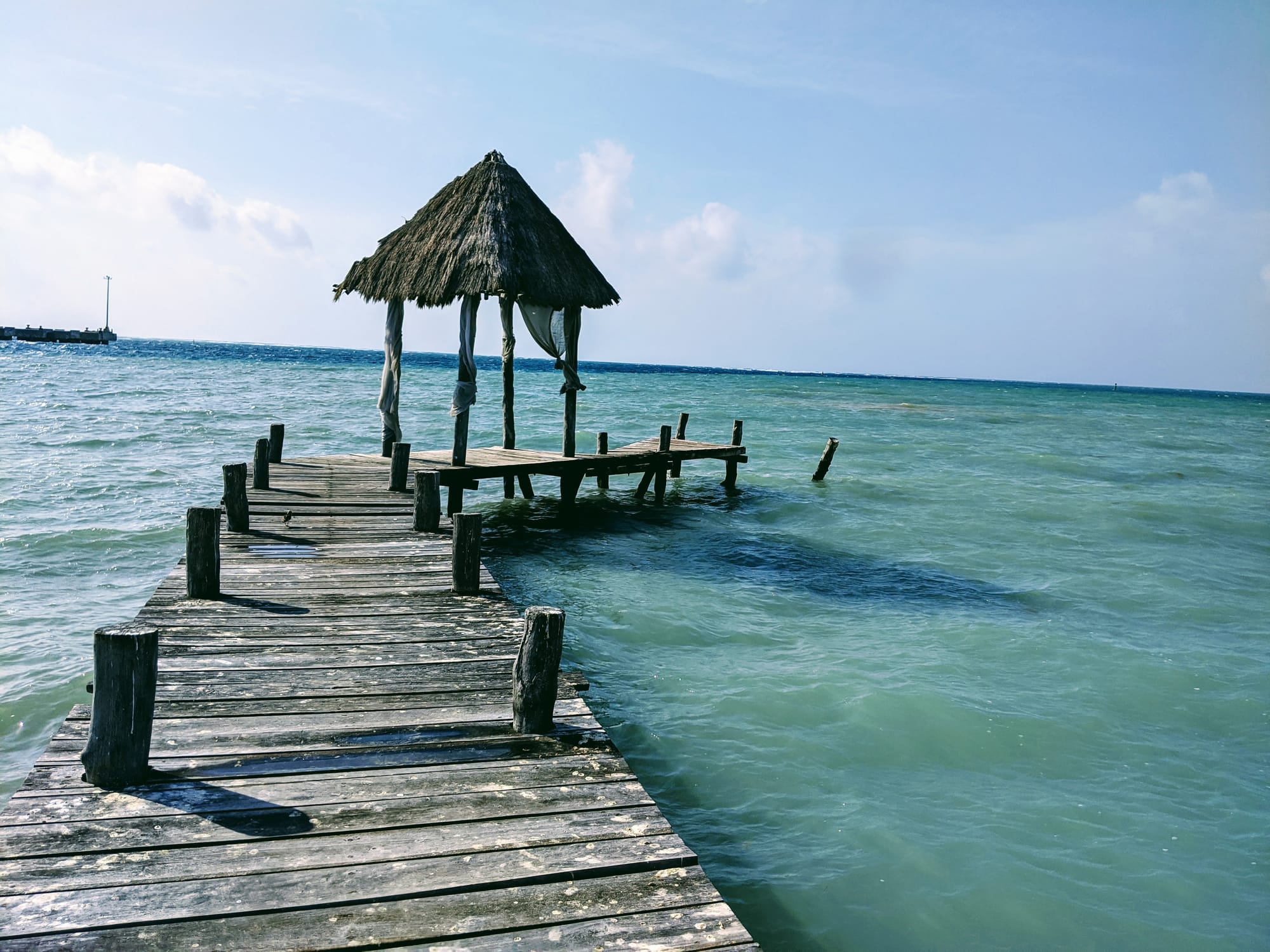
And it is a HUGE country! You have the Caribbean and the Pacific Oceans to choose from, along with the Sea of Cortez, and if you like nature or the mountains, there are scores of villages that are more geared to that. There are also expat communities everywhere and anywhere, so finding English speaking neighbors and friends is not a problem.
Many Americans also speak or understand Spanish, so Mexico is what I call a low hanging fruit; an easy way to step into the nomadic pond. If you DID have to return to the US, it is close, and you won’t be a dozen time zones away to make calls back home.
Along those same lines you have lots of other options in Central and South America, which I’ll get to a bit later since we’ve been there and can share our experiences.
Aside from going south from the US, you will have to go east or west, and that includes Europe, Asia, Africa, and possibly Oceania, which includes Australia, New Zealand, and some of the smaller island nations. Every continent has its own personality, advantages, and disadvantages.
Distance is certainly a consideration, since Europe from the US is five to ten hours flight; Asia, about 50-75% longer, and Down Under, longer still. That must be taken into account when communicating with US time zones, and also return times if you think you’ll need to do that regularly.
Europe should also be broken down into a few sub categories, too, including cosmopolitan, ie, expensive areas, like London and Paris, and less expensive places, like eastern Europe and the Balkans. Asia has its subs, too, and Southeast Asia is a huge draw for many travelers, while Japan, Korea, and China will appeal to different people based on what they are looking for.
Cost of Living
So much of the world is affordable—by US standards—that it becomes very appealing if you are being paid in US dollars, euros, or British pounds. We live in a flat world, and the internet makes the option of being location independent very attainable. In our situation, our cash flow from Social Security and writing allows us a very comfortable lifestyle almost everywhere we go, but in the US—especially California—we’d be in the Poverty Zone.
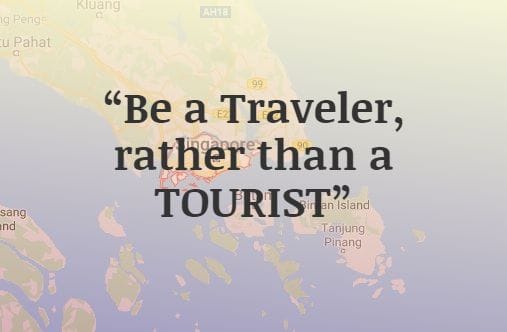
That was one of our biggest incentives to leave, along with Quality of Life.
Culture Shock
If you are reading this and speak English, count your blessings since English is as close to any language in the world as being “universal.” After 43 countries we’ve hardly had any language issues aside from maybe smaller places outside the beaten paths. If you speak Spanish, French, or Italian (any of the Romance Languages), you have another advantage, since much of the world speaks those languages, too. Chinese and Mandarin are widely spoken, but not so much outside Asia.
Along with language you have to think about differences in food, customs, and housing. When we started traveling we had no idea how rare screens were on windows! In many countries they are a luxury, or missing entirely. Hanging our laundry out on a balcony or clothes line felt weird at first, and finding a dryer to go along with a washer, is uncommon.
Electrical plugs differ, as do beds in different places, so I always say that to be a stress free nomad it’s important to be patient, and flexible. There have been many times we’d locate our new room, and have to think twice since the area looked a bit iffy. It rarely was, and in most cases the inside was fine, but our first impression threw us.
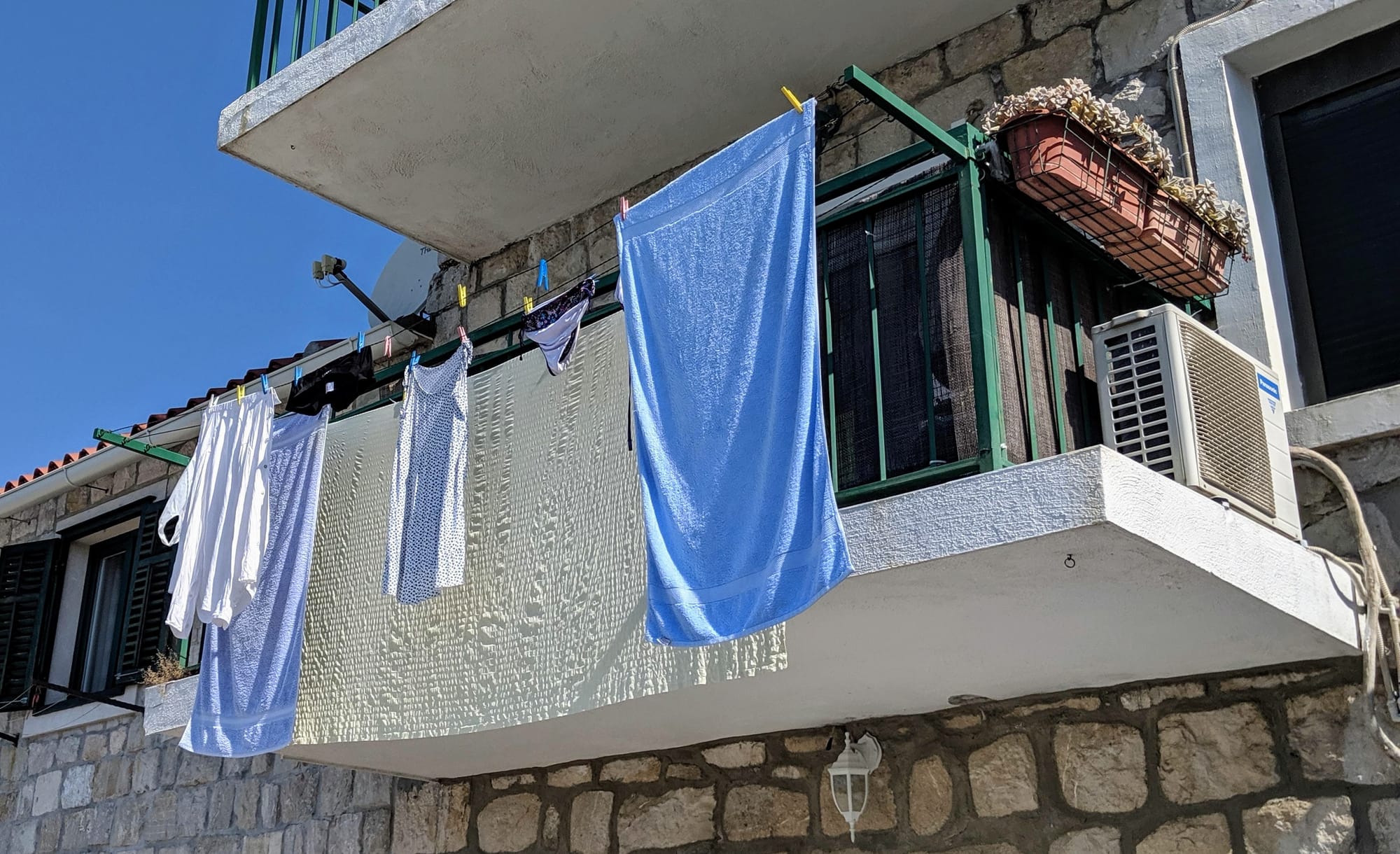
Driving is different in different countries, and there are various degrees of friendliness and hospitality, too. Overall, we have found most residents of every country very pleasant. SOME may be tired and bored with tourists, but if you spend a few weeks in a place and see the same people all the time, they will usually warm up to you.
And if you learn how to say a few words in their native tongue, like, “hello, good, please, thank you,” etc. those courtesies go a long way. Even if you mess up the pronunciation! Learn to laugh at yourself and people will warm to you.
Croatia (again)
We loved Croatia when we first arrived, and I will get into the whys of that in the next chapter.
Thank you for reading and make sure to subscribe. We're constantly exploring new destinations and share our stories, tips, and the beauty we discover along the way.


